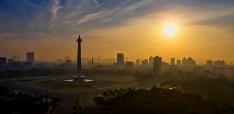Climate Change and Human Rights: Climate Change and Human Rights in East Asia

This column by Paul G. Harris is part of Global Policy’s e-book, ‘Climate Change and Human Rights: The 2015 Paris Conference and the Task of Protecting People on a Warming Planet’, edited by Marcello Di Paola and Daanika Kamal. Contributions from academics and practitioners will be serialised on Global Policy until the e-book’s release in November 2015. Find out more here or join the debate on Twitter using #GPclimatechange.
East Asia is at the frontline in battles to combat climate change and protect human rights. The region has a confluence of countries with highly vulnerable geographies, large and predominantly poor populations, and often authoritarian governance systems. Most of East Asia already suffers from a deficit of civil and political rights, potentially undermining the ability of governments to respond to climate change effectively. Paradoxically perhaps, some governments of the region may use climate change to justify limiting these rights in the future, even as their citizens increasingly exercise (supposed) economic rights to material consumption, thereby contributing to global greenhouse gas pollution. The region’s focus on economic rights over civil and political rights thus contributes to climate change. At the same time, the ability of citizens to participate in policymaking is likely to stagnate or possibly decline as a result of climate change.
Vulnerabilities of Human Rights
Impacts of climate change are increasingly threatening fundamental rights to health and therefore impacting the survival of East Asia’s two billion inhabitants. Communities across the region are highly vulnerable to direct impacts of climate change, including extreme weather events. A case in point is the Philippines, which is struck by typhoons numerous times each year, killing many and causing suffering among countless more. As storms become more frequent, intense, (or both) more people will lose the most fundamental right of all – to life – and millions will likely see their rights to health and livelihood undermined. The right to escape poverty, already difficult to realize, could be made impossible.
Ocean acidification, another manifestation of climate change, will affect marine ecosystems and fisheries which are ultimately the natural resources used for the sustenance of many in the region. If the ability to continue living in one’s community free from such threats is a right, climate change can potentially deny it to millions of people in East Asia. Sea-level rise too – which greatly increases the dangers of storm surges from typhoons, as evidenced in 2013 by the devastation wrought by typhoon Haiyan on the city of Tacloban in the Philippines – will make many East Asian coastlines more dangerous. The resulting devastation could force millions of people to leave their homes and communities, perhaps permanently. Rising sea levels may also cause many coastal and island communities to become uninhabitable due to underground contamination of freshwater aquifers by seawater. They will likely destroy livelihoods and diminish food supplies by inundating estuaries and mangroves, both of which are vital for many fish species. Further, they threaten places along shorelines that are important for cultural or religious reasons.
Millions of other people in the region rely upon local agriculture, not only for food-based survival but also for jobs. Droughts brought on by climate change will make growing food more difficult, and impossible in some places. What is more, climate-related threats to agriculture in other world regions will likely harm hundreds of millions of people in East Asia. In a globalized economy, the prices of rice, corn, soybeans and other staples are set internationally: the poor of East Asia, especially the many millions who are already hungry or can barely afford enough food, will not be insulated from rising prices. Droughts in the region may also threaten ways of life and cultures that have evolved from natural landscapes over centuries. An example can be found in the Mekong River Delta, where cultures are intimately connected with natural water cycles. Climate change could also severely threaten the right to health in East Asia. As the region warms, mosquitoes and other vectors of pathogens will spread. Malaria and dengue fever, already endemic in Southeast Asia, will become more so there, spreading northward and to higher elevations, putting the lives of many at risk.
More generally, the impacts of climate change, including the costs associated with adapting to it, will degrade and potentially deny the right of East Asian countries and people to economic development. Even if countries in the region continue to develop amidst climate change, many of the people who might be lifted from poverty may never get the opportunities they hoped for. This will in turn affect the rights of their children to better health, education and opportunity. In short, a wide spectrum of human rights in East Asia will be undermined by climate change.
Human Rights as Necessities and as (Perceived) Threats
Governments of East Asia (like governments elsewhere) have shown themselves to be unable or unwilling to address climate change effectively. Indeed, the climate-induced violations of human rights around the world will be largely attributable to growing greenhouse pollution coming from East Asia – especially from China, which has been the largest national source of global carbon dioxide emissions for about a decade; increasingly from Indonesia, where economic growth and forest burning results in enormous carbon dioxide emissions each year; and from Japan, one of the largest historical sources of climate pollution.
One reason for this failure may be the low regard that most East Asian governments have for human rights. In many countries of the region, powerful elites still enjoy most of the fruits of economic development while the majority of people remain in poverty. Even where democracy has taken hold it is often stifled by other versions of the same elitism, with regimes denying fundamental civil and political liberties, limiting access to information, and imprisoning opponents. The voices of environmental activists cannot be heard. Independent environmental organizations are severely restricted (or effectively outlawed) in China and much of Southeast Asia. When coupled with the lack of free press, this translates into poorly informed citizens. If citizens are to fully understand the need for better local responses to climate change, these restrictions must be lifted. Informed citizens can put effective pressure on governments and industries in the region to reduce emissions and allocate resources for adaptation. Uninformed citizens, on the other hand, may not even know there is a problem to begin with.
It is also important to bear in mind that climate impacts will make resources scarcer. This could exacerbate existing tensions in the region, possibly leading to domestic or international conflict. As noted, this may in turn push East Asian governments to use climate change as an excuse to sabotage, undermine, or weaken basic civil and political rights, and limit personal freedoms and freedom of the press, ultimately leading to a delay in democracy. Whether this is justifiable is debatable, but it is difficult to dismiss the possibility that it may happen.
The fact is that some rights of East Asians may indeed have to be limited, if the countries in the region are to successfully adapt to climate change. For example, it may be essential to limit, possibly quite strictly, the supposed right of people of East Asia to live in a manner that mirrors the way Westerners (and indeed wealthy East Asians) have lived for decades. Millions of new consumers of East Asia are rapidly becoming the greatest driving force behind climate change. As they buy more, travel more, enjoy modern homes full of modern appliances, and consume much larger quantities of meat (for example), regional greenhouse gas pollution will rise dramatically. This is a recipe for crashing through climatic thresholds. The right to “live like Americans,” as former Chinese leader Deng Xiaoping implored the Chinese to do, may have to be sacrificed if people in China, East Asia (and indeed the world) are to enjoy their right to survive and thrive (albeit with simpler ways of life), amidst future climate change.
In other words, the rights that East Asians are increasingly enjoying are climatically speaking, the wrong kind of rights. Civil and political rights are not widely enjoyed and yet they may be essential if the region’s political systems are to respond effectively to climate change. At the same time, the increasing exercise of some economic rights by hundreds of millions of people – specifically those that facilitate growing material consumption, most of it reliant on greater burning of fossil fuels and thus the source of more greenhouse gas emissions – may make responding to climate change much more difficult. Striking a balance between recognizing and protecting most rights while restricting some others will be a hard task indeed, particularly as many governments in the region have effectively substituted the provision of freedoms with the implementation of policies serving rapid material economic growth as the source of their legitimacy. In short, the “human rights” policies that are now common in much of the region are the opposite of what is climatically required.
Recent improvements in the protection of political rights in East Asia may be reversed due to climate change, both by actual environmental changes and by governments. There is some irony here: many Western governments who have refused to combat climate change aggressively in the recent past have also vigorously criticized the authoritarianism of many East Asian governments on human rights grounds. These Western governments may now discover that their past inaction on climate change may provide excuses for perpetuating the very authoritarianism that they have long been criticizing.
Policy Responses
What can be done to protect human rights from climate change and from governments that intend to or could use it as an excuse to limit the political rights of people in East Asia? It is too late to stop climate change; that said, limiting emissions of greenhouse gases might limit impacts in the future. However, attention must be focused on assisting countries of the region, including communities and individuals within them to adapt effectively by developing in ways that are environmentally sustainable. Policy options for doing this include substantially increasing international financial and technical assistance for climate adaptation, and increasing levels of development aid for poorer countries of the region.
Appropriate incentives should encourage governments of the region to use their limited financial resources in ways that protect rather than undermine basic human rights threatened by climate change. For example, one approach might be connecting trade preferences to spending on climate-resilient infrastructure. Further, greater scrutiny of regional governments’ human rights records and concrete policies to encourage respect for human rights is needed. At the same time, policies that promote material consumption at the expense of the environment should be discouraged. This may undermine some assumed economic rights of countries and people, but the global threat to survival posed by climate change trumps such rights.
Most obviously, the “rights” of new economic elites in East Asia to live affluent lifestyles, and arguably the “rights” of growing middle classes to consume vastly more than they need for health and happiness clearly ought to not take priority over the basic rights to escape starvation and disease (and thus to live), that must be enjoyed by every living person in and outside that region. To paraphrase Henry Shue, any acceptable definition of climate justice would not require the poor to sacrifice their survival so that the affluent can enjoy their jewellery.
The inevitable failure of the December 2015 Paris conference of the parties to agree on policies that will substantially reduce global greenhouse gas emissions anytime soon means that climate-related threats to human rights in East Asia will increase. The international funding that will be agreed upon in Paris will be far less than what is needed, meaning that coping mechanisms within the region will not be as robust as they should be. Nevertheless, Paris may – with enormous luck – be a long-overdue turning point toward taking much more action on climate change. If that happens, human rights in East Asia could be less threatened than they would be otherwise. That, at least, is something that the people of the region have a right to hope for.
Paul G. Harris is author or editor of more than 20 books on global environmental politics, policy and ethics, including: What’s Wrong with Climate Politics and How to Fix It (Polity Press) and Global Ethics and Climate Change (Edinburgh University Press). He is the Chair Professor of Global and Environmental Studies at the Hong Kong Institute of Education.


